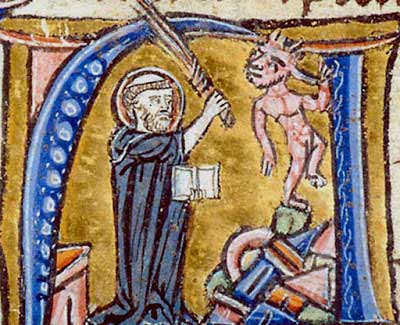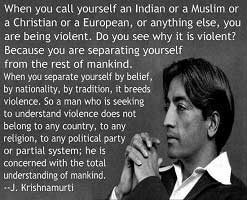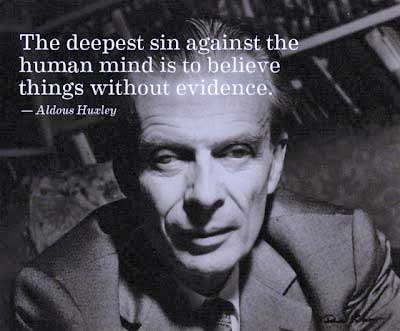
Augustine of Hippo Refuting Heretic |
Augustine on the Eternal Joy that Comes From Seeing What Is Happening in Hell
Augustine was the first Christian theologian to write a biblical defense of the view that the lost will suffer forever in hell. If youʼre familiar with the way that previous church fathers — even those who believed in eternal torment — wrote, youʼll recognize that this is something new. This was almost a systematic case for eternal torment, and due to its length (compared with anything that had come before) and Augustineʼs major influence, it became the standard. It took some time for dissenters to again be heard with any significant volume against this backdrop. See Augustineʼs City of God (written soon after the year 410) Book 21.
The New Advent Catholic Encyclopedia repeats some of Augustineʼs arguments when it points out:
The Holy Bible is quite explicit in teaching the eternity of the pains of hell. The torments of the damned shall last forever and ever (Revelation 14:11; 19:3; 20:10). They are everlasting just as are the joys of heaven (Matthew 25:46). Of Judas, Christ says: “it were better for him, if that man had not been born” (Matthew 26:24). But this would not have been true if Judas was ever to be released from hell and admitted to eternal happiness. Again, God says of the damned: “Their worm shall not die, and their fire shall not be quenched” (Isaiah 66:24; Mark 9:43, 45, 47). The fire of hell is repeatedly called eternal and unquenchable. The wrath of God abideth on the damned (John 3:36); they are vessels of Divine wrath (Romans 9:22); they shall not possess the Kingdom of God (1 Corinthians 6:10; Galatians 5:21), etc.
Source
But Augustine went even further. He taught that the memories of the redeemed in the future kingdom of God will be not only supernaturally maintained but enhanced such that they retain all the knowledge of their past sufferings on earth as well as knowledge of the eternal sufferings of the lost in hell, because only by carrying such knowledge around with them for eternity can they truly appreciate what their own salvation means. Otherwise at some point in eternity they might forget what they were saved from, and not remain eternally grateful to God.
To quote Augustine,
…their intellectual knowledge, which shall be great, shall keep them acquainted not only with their own past woes, but with the eternal sufferings of the lost. For if they were not to know that they had been miserable, how could they, as the Psalmist says, forever sing the mercies of God? (Psalm 89:1)… Those who shall be in torment shall not know what is going on within in the joy of the Lord; but they who shall enter into that joy shall know what is going on outside in the outer darkness.
Source 1 and Source 2
Later Christian writers would expand on Augustineʼs point but it was now new. In The Apocalypse of Peter the saved witness the torments of the damned. In the Gospel of Nicodemus, those about to be rescued watch Christ throw the wicked into the pit, Tartarus. Earlier still, there were passages in the Bible that depict something similar. You can skip to the end of this post to read them.
Thomas Aquinas would later argue, based on similar premises, to a conclusion similar to Augustineʼs. Keep in mind such a view became one of the hallmarks of Christianity as supported by some of Christianityʼs leading thinkers as we will see below.
Source
|
Triumph of St. Thomas Aquinas [center] over the Heretics. |
Thomas Aquinas on the Eternal Joy that Comes From Seeing Perfectly the Sufferings of the Damned
According to Aquinas the blessed will not pity the unhappiness of the damned. For we choose to have compassion when we wish the suffering of others to stop, and so when we do not wish their suffering to stop, we have no such compassion. Since it is impossible to stop the suffering of the damned, and because it would in any case be contrary to Divine justice, the blessed will have no compassion for them.
Aquinas goes even further, arguing via logical propositions that we will see the damned suffering and we will rejoice:
Nothing should be denied the blessed that belongs to the perfection of their beatitude. Now everything is known the more for being compared with its contrary, because when contraries are placed beside one another they become more conspicuous. Wherefore in order that the happiness of the saints may be more delightful to them and that they may render more copious thanks to God for it, they are allowed to see perfectly the sufferings of the damned… The saints will rejoice in the punishment of the wicked, by considering therein the order of Divine justice and their own deliverance, which will fill them with joy. And thus the Divine justice and their own deliverance will be the direct cause of the joy of the blessed: while the punishment of the damned will cause it indirectly.
Source
Martin Luther on the Acme or Highest Degree of Faith
Martin Luther admitted that he could not comprehend how this God can be merciful and just who displays so much wrath and iniquity and added that Godʼs goodness appears hidden, hence the need for faith of the highest degree:
God hides his eternal goodness and mercy under eternal wrath, his righteousness under iniquity. This is the highest degree of faith, to believe him merciful when he saves so few and damns so many, and to believe him righteous when by his own will he makes us necessarily damnable, so that he seems, according to Erasmus, to delight in the torments of the wretched and to be worthy of hatred rather than of love. If, then, I could by any means comprehend how this God can be merciful and just who displays so much wrath and iniquity, there would be no need of faith. As it is, since that cannot be comprehended, there is room for the exercise of faith when such things are preached and published, just as when God kills, the faith of life is exercised in death.
The Bondage of the Will, 1525
Luther praised the love of God that might even damn him to hell, and declared in The Bondage of the Will, “God himself does evil through those who are evil.”
Martin E. Marty, “Martin Luther: A Life”
John Calvin on Godʼs “Dreadful Decree”
I again ask how it is that the fall of Adam involves so many nations with their infant children in eternal death without remedy unless that it so seemed meet to God? Here the most loquacious tongues must be dumb. The decree, I admit, is, dreadful; and yet it is impossible to deny that God foreknow what the end of man was to be before he made him, and foreknew, because he had so ordained by his decree. Should any one here inveigh against the prescience of God, he does it rashly and unadvisedly. For why, pray, should it be made a charge against the heavenly Judge, that he was not ignorant of what was to happen? Thus, if there is any just or plausible complaint, it must be directed against predestination.
Institutes of the Christian Religion Book 3, Sec. 23, 7
Speaking of this passage, nineteenth century Reformed theologian, Dr. H. J. Van Dyke, admitted:
Now let us be candid with ourselves, and even with our opponents. Historic Calvinism does include what Calvin himself calls the horribile decretum, that by the election and predestination of God many nations, with their infant children, are irretrievably doomed to eternal death.
“Variations within Calvinism,” pp.39-40
In similar fashion Calvin wrote:[When it comes to Godʼs honor] He banishes all those human affections which soften our hearts; that he commands paternal love and all the benevolent feelings between brothers, relations, and friends to cease; in a word, that He almost deprives men of their nature in order that nothing may hinder their holy zeal. Why is so implacable a severity exacted but that we may know that God is defrauded of His honor, unless the piety that is due to Him be preferred to all human duties, and that when His glory is to be asserted, humanity must be almost obliterated from our memories?
Source
God makes plain that the false prophet is to be stoned without mercy. We are to crush beneath our heel all affections of nature when His honor is involved.
Calvinʼs comment on Deuteronomy 13:
Let us also learn that nothing is less consistent than to punish heavily the crimes whereby mortals are injured, whilst we connive at the impious errors or sacrilegious modes of worship whereby the majesty of God is violated.
Calvinʼs comment on Exodus 32:29
One should forget all mankind when His glory is in question. God does not even allow whole towns and populations to be spared, but will have the walls razed and the memory of the inhabitants destroyed and all things ruined as a sign of His utter detestation, lest the contagion spread.
Defense of Orthodox Faith against the Prodigious Errors of the Spaniard Michael Servetus, published in early 1554.
Jonathan Edwards on Rejoicing Even if Oneʼs Wife, Children or Closest Friends Wind Up In Eternal Hell
Quote from Jonathan Edwards, The Life of David Brainerd about a womanʼs depth of faith:
This woman has discovered a very sweet and heavenly frame of mind… Discovering an unusual joy and satisfaction in her countenance… I inquired into the reason of it [and] she replied that God had made her feel that ‘twas right for him to do what he pleased with all things; and that ‘twould be right if he should cast her husband and son both into hell; and she saw ‘twas so right for God to do what he pleased with them, that she could not but rejoice if God should send them into hell, though ‘twas apparent she loved them dearly.
More great words of faith:
You that have godly parents… You will see them with a holy joyfulness in their countenances, and with songs in their mouths. When they shall see you turned away and beginning to enter into the great furnace, and shall see how you shrink at it, and hear how you shriek and cry out; yet they will not be at all grieved for you, but at the same time you will hear from them renewed praises and hallelujahs for the true and righteous judgments of God, in so dealing with you… After they shall have seen you lie in hell thousands of years, and your torment shall yet continue without any rest, day or night; they will not begin to pity you then; they will praise God, that his justice appears in the eternity of your misery… singing the more joyful for the glorious justice of God which they behold in your eternal condemnation. [The last sentence was from earlier in the same essay].
Jonathan Edwards,“The Ungodly Warned”When the saints in glory… shall see how miserable others of their fellow-creatures are, who were naturally in the same circumstances with themselves; when they shall see the smoke of their torment, and the raging of the flames of their burning, and hear their dolorous shrieks and cries, and consider that they [the saints] in the mean time are in the most blissful state and shall surely be in it to all eternity; how will they rejoice!
Jonathan Edwards 1834, sec. II)
Famed Hymn Writer, Isaac Watts, “Thy Just Revenge Adore”
Thy hand shall on rebellious kings
A fiery tempest pour,
While we beneath thy sheltʼring wings
Thy just revenge adore.
[Book 1 Hymn 42]
There endless crowds of sinners lie,
And darkness makes their chains;
Tortured with keen despair they cry,
Yet wait for fiercer pains.
Not all their anguish and their blood
For their old guilt atones,
Nor the compassion of a God
Shall hearken to their groans.
[Book 2, Hymn 2]
Lord, I ascribe it to thy grace,
And not to chance as others do,
That I was born of Christian race,
And not a heathen, or a Jew.
[Divine and Moral Songs, Song 6, Praise for the Gospel]
Quotations from Christians of Lesser Prominence Than Those Above
Tertullian
What a spectacle when the world and its many products, shall be consumed in one great flame! How vast a spectacle then bursts upon the eye! What there excites my admiration? What my derision? Which sight gives me joy?… as I see… illustrious monarchs… groaning in the lowest darkness, Philosophers as fire consumes them! Poets trembling before the judgment-seat of Christ! I shall hear the tragedians, louder-voiced in their own calamity; view play-actors in the dissolving flame; behold wrestlers, not in their gymnasia, but tossing in the fiery billows… What inquisitor or priest in his munificence will bestow on you the favor of seeing and exulting in such things as these? Yet even now we in a measure have them by faith in the picturings of imagination.
[De Spectaculis, Chapter XXX]
St. Anthony Mary Claret
Once [a soul] is condemned by God, then Godʼs friends agree in Godʼs judgment and condemnation. For all eternity they will not have a kind thought for this wretch. Rather they will be satisfied to see him in the flames as a victim of Godʼs justice. (“The just shall rejoice when he shall see the revenge . . .” Psalm 57:11) They will abhor him. A mother will look from paradise upon her own condemned son without being moved, as though she had never known him.
“The Pains of Hell,” Ignatian Spiritual Exercises, consisting of thirty-five meditations from The Spiritual Exercises of Saint Ignatius as explained by St. Anthony Mary Claret. St. Claretʼs ‘explanations’ were written in Spanish in the late 1800ʼs. (www.fatima.org)
Catholic Truth Society
What will it be like for a mother in heaven who sees her son burning in hell? She will glorify the justice of God.
Catholic Truth Society pamphlet from the late 1960s, part of a catechismal teaching [cited in an essay by the English poet, Stevie Smith, “Some Impediments to Christian Commitment”]
Thomas Boston [Scottish preacher]
God shall not pity them but laugh at their calamity. The righteous company in heaven shall rejoice in the execution of Godʼs judgment, and shall sing while the smoke riseth up for ever.
William King
The goodness as well as the happiness of the blessed will be confirmed and advanced by reflections naturally arising from this view of the misery which some shall undergo, which seems to be a good reason for the creation of those beings who shall be finally miserable, and for the continuation of them in their miserable existence.
[De Origine Mali, 1702]
Something on Which Catholics and Calvinists Agreed
For centuries, Christians believed that the heavenly few would see and even rejoice at the sight of hellʼs multitude being eternally tortured. As Paul Johnson pointed out in A History of Christianity, “This displeasing notion was advanced and defended with great tenacity over several centuries, and was one of the points Catholics and orthodox Calvinists had in common.”
This “abominable fancy” (as it came to be named) was based on various Bible verses:
The righteous shall rejoice when he sees the vengeance.
Psalm 58:10
Let the wicked perish at the presence of God. But let the righteous rejoice before God: yea, let them exceedingly rejoice.
Psalm 68:2-3,22-23
In Isaiah 30:31-33 a human sacrifice takes place (the ‘man’ who is killed represents the nation of Assyria), and the act is accompanied by festival songs, gladness of heart, the sound of the flute, tambourines and lyres. Moreover, “the Lord” performs the sacrifice.
And they shall go forth, and look upon the carcasses of the men that have transgressed against me.
Isaiah 66:24
A man suffering in ‘Hades’ sees another man luxuriating in ‘Abrahamʼs bosom,’ and vice versa.
Luke, chapter 16
Ye shall see Abraham, and Isaac, and Jacob, and all the prophets, in the kingdom of God, and you yourselves thrust out.
Luke 13:28
They shall be tormented with fire and brimstone in the presence of the holy angels, and in the presence of the Lamb: And the smoke of their torment shall ascend up forever and ever. Rejoice over her, thou heaven, and ye holy apostles and prophets; for God hath avenged you on her. And again they said, Alleluia. And her smoke rose up for ever and ever.
Revelation 14:9-11; 18:20, 19:3
Having such ‘inspired’ verses behind it, this teaching did not grow out of favor with orthodox Christian theologians until the age of the Enlightenment when, for instance, Thomas Burnet punctured it with a prick of irony, “What a theater of providence this is: by far the greatest part of the human race burning in flames forever and ever. Oh what a spectacle on the stage, worthy of an audience of God and angels! And then to delight the ear, while this unhappy crowd fills heaven and earth with wailing and howling, you have a truly divine harmony.” [De Statu Mortuorum & Resurgentium Tractatus, 1720]
But even today the idea is defended even with enthusiasm as in Trevor C. Johnsonʼs thesis, Seeing Hell, which is online here, composed for his masterʼs degree in Biblical Studies at Reformed Theological Seminary in 2004. It should be noted that his doctrinal beliefs no matter how dark they may appear to some, do not seem to interfere with his desire to love and help others. Johnson is a loving and faithful Christian missionary, husband, and parent who serves some poor villagers in a potentially dangerous mission field. Trevor and I have shared emails of a pleasant nature since he contacted me first after finding some references to “the abominable fancy” in my book, Leaving the Fold: Testimonies of Former Fundamentalists.
I would like some Evangelical Christian apologists on the web who disagree with the views I have cited from Christian leaders to read Johnsonʼs masterʼs thesis which is now online (and also offered at amazon.com where some Christian readers awarded it four out of five stars) and ponder why the Holy Spirit allowed the most prominent figures in Christendom to come up with such conclusions even after praying to the Holy Spirit who is supposed to lead Christians into all truth. And think of the consequences of such teachings being held so prominently by so many Christians for so long.
Positive Amazon reviews of Seeing Hell:
By M. Pierceon
The author leads the reader through a systematic analysis of views expressed by past and present religious figures regarding his subject, and then applies Holy Writ in a convincing manner. The book persuaded me that hell is visible from heaven, and that the glory of a holy God is thereby magnified. Not for the squeamish, or for those whose god is a jolly rendition of Santa Claus.
By Ronald Miller Sr.
Donʼt leave earth without reading. A side of Godʼs glory you probably havenʼt heard. Excellent for believers & Non-believers, Biblically sound, Answers the tough “God” questions, page turner, describes attributes of God and His rational, How God has glory from those in Hell, Doctrine of Grace, What heaven will be like, Why the sight of the saints in heaven will include hell, comprehensive research, evidenced in over 200 footnotes, Joy in seeing those in hell!
By Peggion
This fellow presents a compelling case that those in heaven will be able to see those in hell and vise versa. My granddaughter recently told me her fellowship group was discussing this concept and I decided to research it. Trevor Johnsonʼs work was one of the first I came across, and I found it to be a compelling, well researched, and carefully presented case. He presents both Biblical and historical evidence for his theses. I highly recommend this book.
By Richard O. Tailleferon
The author turns to the Scriptures revealing what the Bible has to say concerning heaven and hell, and whether the saints will behold hell, and the wicked will behold heaven. The author demonstrates the Bible clearly reveals that the saints shall view the wicked in hell and glorify God for their salvation, while those in hell will see the saints in heaven adding to their torment.
Extra Credit
READ Heaven and Hell in Christian Thought at The Stanford Online Encyclopedia of Philosophy







